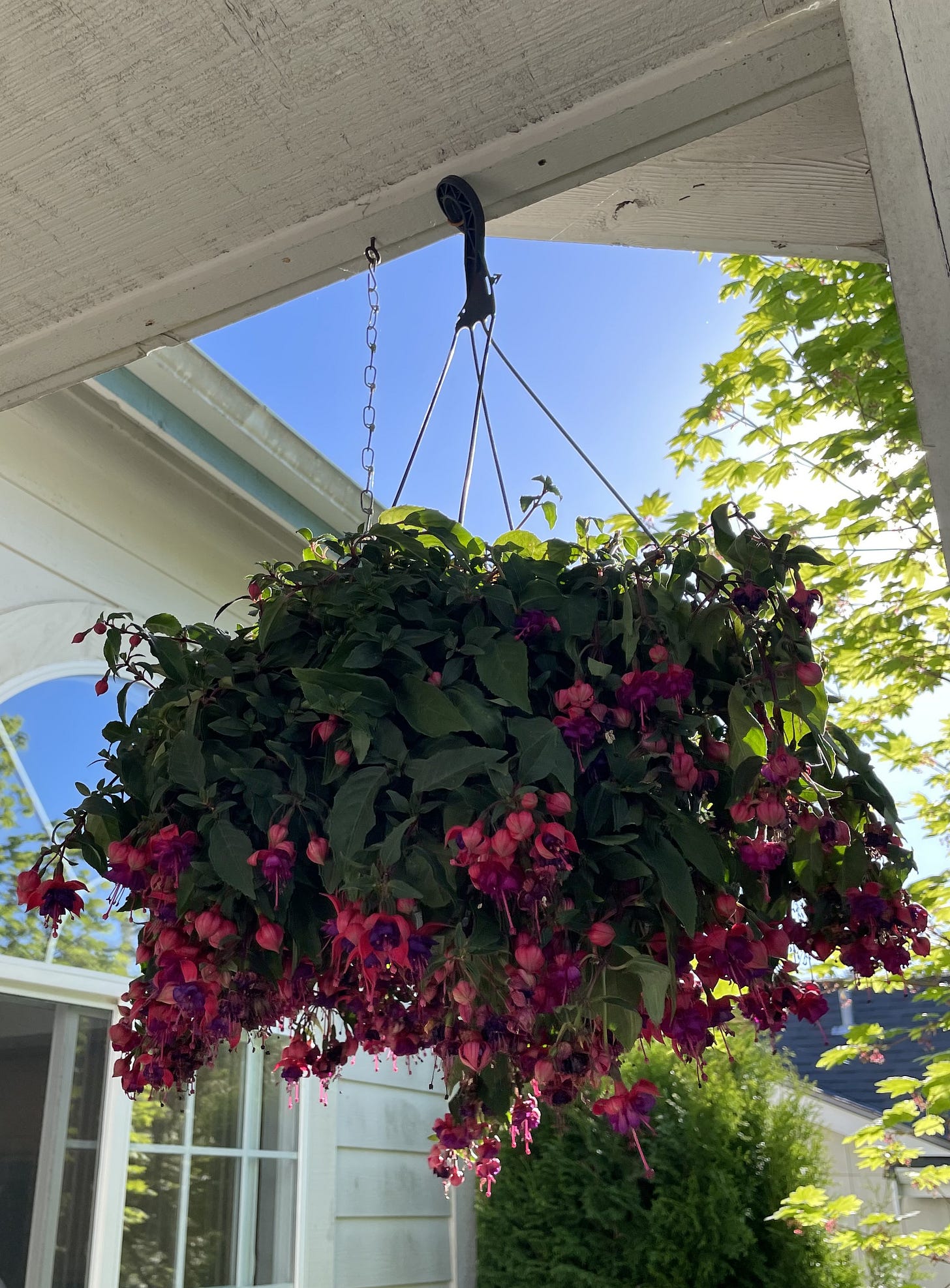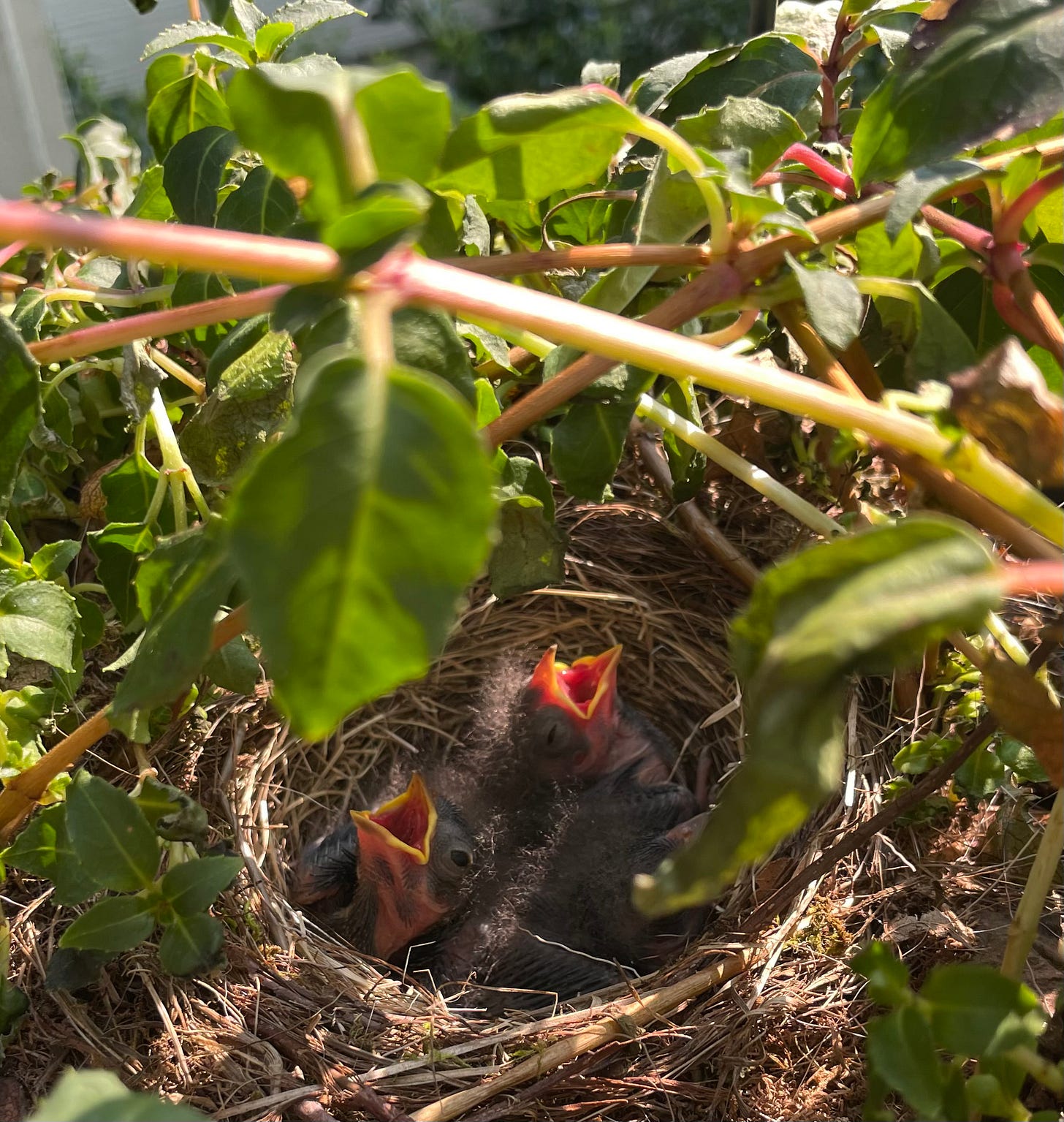“Well, I think your fuchsia plant is going to die.”
Huh. That sounded like my husband’s way of reminding me to water the beautiful plant he got me for my birthday. I love that plant. In mid-April in the Pacific Northwest, the bright pink is a welcome sign of spring. I looked up from my phone.
“I don't know if I can water it anymore,” he said, “because there is a bird's nest in it. I just watered it, and a bird flew out.”
That. Is. Awesome!
As much as I had enjoyed the plant, the idea of my very own bird nest on my very own porch just delighted me.
I brought the plant down from the hook where it was hanging, and I examined it. There was a tiny nest with four little eggs.
I checked on them regularly. I watched the parent juncos hovering in and around the plant. I waited patiently to see the cute little babies.
When the babies arrived, they were not cute. But I loved the strange, open-mouthed creatures all the same.
I checked on them a lot. I counted them. I worried as they went from four open mouths to three. I checked on them after it rained. I watched them fatten up and decrease in number again to two adorable, tiny, round fuzz balls.
One afternoon, as I was on my way to pick up Charlie from a friend’s house, I peered into the nest, just as I had about every other day since they hatched. This time, they spooked. They jumped out of their nest and into the dead leaves and detritus below the porch.
I tiptoed through the detritus looking for them. I caught a glimpse of one running on the lawn. I chased it. The mama bird dove at me, shrieking. I ducked around her apologetically. I saw one of the babies run into the road and hide under the neighbors’ car. I yelled for Matt to come flush it out. After some confusion stemming from the fact that I was also mostly under the car, Matt startled the little ball of fluff right into my hands. I was so surprised I dropped it. Before it could run too far, I caught him again, and I started to run. I ran all the way back to the porch cradling the little ball of fluff in my hands. I cooed to it and gently placed it back home in the nest.
And that little fluffer jumped right out again.
We had to go. With no great choices available, I left the plant on the ground, and I got in the car as the parent birds continued chirping angrily at me.
I checked the nest when I got back. No birds. Again, the next morning, no birds.
I called the vet, looking for hope. I asked her if she thought the baby birds might make it.
She did not.
“Are the parent birds still there?” she asked.
“No,” I said. “They yelled at me for a day and then left.”
“They are probably just moving on with their bird lives,” she said, “Nature is brutal.”
As I hung up the phone, tears came to my eyes. Nature is brutal. I guess I had been hoping for more of a Jurassic Park/Jeff Goldblum-esque “Life finds a way.”
I hadn’t cried for the first two baby birds that died in the nest. I know that not every egg turns into a grown bird. But, these two birds—this particular brutality—is on me.
Ugh. Isn’t destruction of nature something that bad people do? I’m not a baby-bird-killing monster! I loved those little guys, and I just wanted to be a part of that new life.
I’m an environmentalist. Who accidentally killed some baby birds.
I’m an environmentalist.
Who drives a gas-guzzling car.
Who takes cross-country flights.
Who takes really long, hot showers.
As environmentalists and Climate Pessimists, we’ve felt grief over natural and environmental losses. We know the guilty feeling of complicity, living in a society built around the burning of fossil fuels. We live with the moral injury of knowing that we are not completely living into our values.
How, then, do we find hope?
When I say “hope,” I don’t mean optimism. Optimism says, “I'm sure the birds are just fine.” Or, “You know, humanity has made it this far, I’m sure scientists will find us a way out of climate change too.” As great as that would be, optimism by itself doesn’t help us confront the realities of today and figure out what we should do next. This kind of optimism can encourage us to passively wait for things to get better, but what the world needs is for us to be working together to build a more sustainable, more just society. That takes hope.
We don’t just hope nothing bad happens. Hope means when something bad happens, we see it for what it is, and act differently as a result. We don’t look away from environmental losses. When we hope, we grieve, we acknowledge our guilt or complicity, and we allow our feelings to motivate us to act. Hope feels the feelings, looks the situation in the eye, and does the next best thing. Hope tries again. Hope keeps going. Hope maybe tries something different next time.
When we hope, we see and take responsibility for the damage that has been done to the planet. We take the next best step for the planet and the life still on it. We are not absolved of our responsibility for the damage that we have done, but neither is our story over. We grow. We let go of the idea of perfect action, and we strive to do better. Hope keeps us working.
About a week after the baby bird incident, the mom and dad juncos were back on my porch, bringing twigs and grass to a spot in the awning. Their new nest was much higher up, where I couldn’t check on them. I briefly considered setting up a webcam (for science). But, wiser now, I didn’t.
I’m different. The nest is different. We’re all trying again.
I’m excited about these new babies I’ll never (even try to) see. There is hope and joy in this new beginning. I’m not absolved of my guilt, but neither is this story over.
This piece is part of my work on my upcoming book titled (for now) A Climate Pessimist Finds Hope. Please comment! Is there something here that makes you think, “well, yeah, but, what about….” Tell me about it! Do I use a particularly persuasive or not persuasive argument? Tell me before the bad stuff ends up in the book!
For more on the book see:





